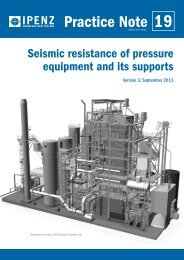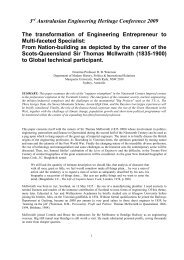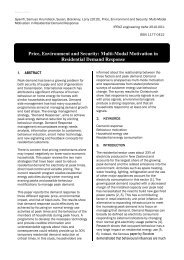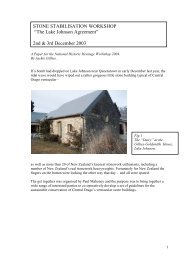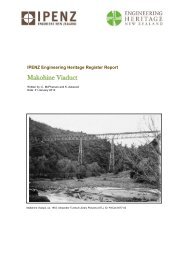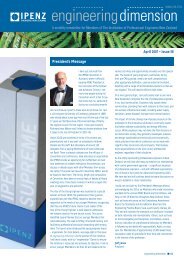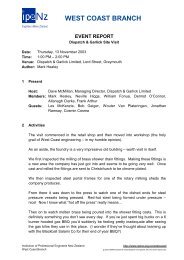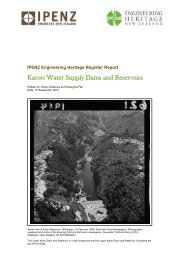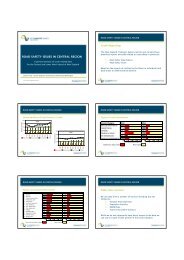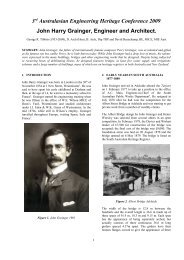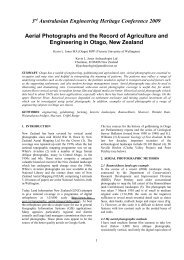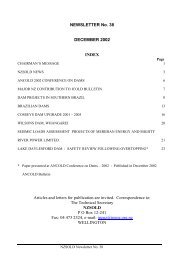Roundabout 123 Dec 2009 - ipenz
Roundabout 123 Dec 2009 - ipenz
Roundabout 123 Dec 2009 - ipenz
Create successful ePaper yourself
Turn your PDF publications into a flip-book with our unique Google optimized e-Paper software.
Urban Transport Congestion Remedies<br />
Members Articles<br />
This paper has been written in response to David Willmott‘s contribution to <strong>Roundabout</strong>, Issue 122, October<br />
<strong>2009</strong> headed ―Congestion!!! Can we fix it ?? (Affordably ??)‖.<br />
I have had a fairly long career in transport during which I have been a highway engineer, traffic engineer,<br />
and transport planner in regional and local government in Auckland and, both initially and now, a consultant.<br />
I am a Chartered Professional Engineer. I have lived in several countries and travelled fairly widely. I have<br />
lived in cities which are public transport dominated and cities which are car dominated. I like cities. They are<br />
the places where large numbers of people meet, interact, develop ideas, create wealth, and bring up<br />
families. All are different. None are perfect. Some are a lot better than others, but how much so might<br />
depend on how you measure ―better‖.<br />
So what, you might well ask? Well, I think have learned enough from my various experiences to know that:<br />
No one person or one philosophy has all the answers.<br />
Those cities which plan for the longer term; have clear strategies and apply them consistently over a<br />
long period; take an incremental approach to change; and are prepared to regularly review and<br />
adapt plans to changing circumstances tend to do best (A city‘s location, population characteristics,<br />
economy and history also matter of course).<br />
Successful cities learn from others but develop their own solutions to their specific issues.<br />
No single profession has a right to claim the moral or philosophical high ground when it comes to<br />
urban transport and urban planning.<br />
Engineers will only be seen as self serving if they argue that decisions should primarily be made by<br />
engineers. As the transport system can have a profound effect on a city‘s future and that of its citizens,<br />
decisions on its development should not be primarily determined by any one group of professionals. Rather<br />
they should be directed towards achieving the strategic goals set by the community they serve.<br />
Auckland has developed a land use form that relies on and encourages very high, some might say,<br />
excessive use of the car. Our public transport system is poor in comparison with competing cities. We have<br />
relegated pedestrians to second class status for too long, forgetting that it people not vehicles that make a<br />
city great.<br />
I agree with the point that public transport will struggle to achieve 20% of all trips in a low density city such as<br />
Auckland. Vancouver has a much denser city centre and a better public transport system but achieves<br />
around 15% if I remember correctly. However, the overall public transport percentage hides very sharp<br />
differences. While the proportion of public transport use in outer suburbs may struggle to achieve 5%, it can<br />
be 50% or higher in the CBD and well over 20% in sub-regional centres well served by public transport. It is<br />
in these centres where the advantages of proximity really matter.<br />
I agree that the benefits of new urbanism or smart growth are often exaggerated. But that does not mean<br />
that we should not adopt and implement the concept where appropriate.<br />
I totally disagree with a line of argument that says that we should provide more of a particular product simply<br />
because that satisfies people‘s needs. Society attempts to limit the consumption of many products that meet<br />
―needs and wants‖ because of their harmful effects. That limitation may be through pricing or legislation.<br />
Road use is underpriced when the social costs including congestion and environmental costs are taken into<br />
account. If we are going to argue that supply should meet needs, then that supply should be based on<br />
proper pricing. Congestion pricing combined with the elimination over time of measures such as the<br />
excessive supply of free (and therefore subsidised) parking must be in place if we are to know what the true<br />
demands are.<br />
The people who advocate more of the same in road building also seem to argue that mankind has little or<br />
nothing to do with climate change as it is a natural phenomenon. Climate change threatens to have huge<br />
consequences for humanity. In the coming decades many millions of people may have to move or starve.<br />
Huge increases in food production are needed to feed the 9 billion or people expected in the future, but<br />
climate change is expected to make that more difficult. Yet many see the apparently strong evidence that we<br />
are the prime contributors to climate change as a conspiracy. Surely, common sense tells us to do what we<br />
12 <strong>Roundabout</strong> No.<strong>123</strong> <strong>Dec</strong>ember 09



